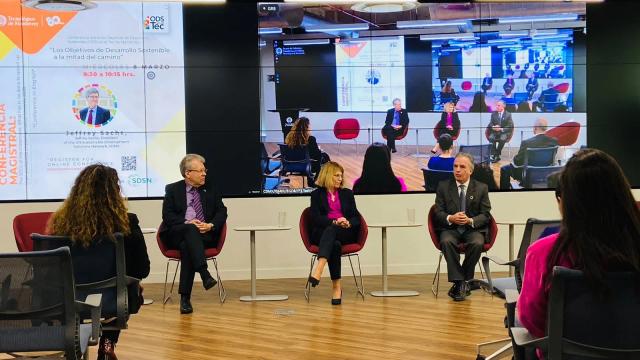Professor Jeffrey Sachs, President of SDSN, Participated in the SDG Conference at Tec de Monterrey: "The SDGs at the Halfway Point to 2030"
On March 8, 2023, the School of Government and Public Transformation at Tecnológico de Monterrey, co-host of SDSN Mexico, hosted the “Conference on the Sustainable Development Goals (SDGs) and progress on their implementation towards 2030” in Mexico City.
The conference included the participation of professors, researchers, thematic experts, and representatives from the Federal Government and the private sector, with the objective of discussing achievements, challenges, commitments, public policies, and engagement of different sectors towards the achievement of the 2030 Agenda. As a panelist, Prof. Jeffrey Sachs, President of the UN Sustainable Development Solutions Network, offered a keynote address on the challenges and actions needed to ensure the implementation of the SDGs by 2030.
During his speech, Prof. Sachs thanked Tecnológico de Monterrey for the invitation to participate in the conference, recognizing the leadership of SDSN Mexico’s co-host institution in contributing to sustainable development in Mexico and ensuring that no person is left behind.
Regarding the state of the SDGs around the world, he regretted the setbacks in the international community. He mentioned that although the world was facing different growing challenges such as poverty, environmental deterioration, climate change, as well as potential financial crises prior to 2020, these issues worsened with the arrival of the COVID-19 pandemic. This has resulted in an even more complex landscape due to the geopolitical crises, rising tensions between countries, and a global economic crisis.
Prof. Sachs stressed that current estimates are discouraging, because although there are various international frameworks, such as the Paris Agreement, the current concentrations of greenhouse gases are so high that they will cause serious damage to the environment, permanently. In this regard, he also recognized the commitment of over one hundred countries that have established objectives and mechanisms favoring decarbonization, as well as the prioritization of renewable energy, such as solar and wind. In particular, Prof. Sachs highlighted the case of North America, where the United States, Canada and Mexico have integrated a shared energy system which is expected to leverage Mexico's solar potential and Canada's hydroelectric potential. However, Prof. Sachs mentioned that the climate agenda and the SDGs require efficient governance, with a long-term vision that considers important aspects such as technology, demographics, infrastructure facilities, among others.
Another prevailing issue addressed by Prof. Sachs was financing for sustainable development, since a great mobilization of resources is needed to achieve the SDGs. All of the SDGs require large investments in new technologies, whether it is zero-carbon energy, precision agriculture, or digital platforms. All require a broad strategy of long-term financing with budgetary frameworks that extend for ten, twenty, or twenty-five years, a scenario that does not currently take place anywhere in the world.
Finally, Prof. Sachs highlighted the importance of strengthening international, regional, and local cooperation to make the 2030 Agenda and the SDGs more than just a promise of change. It is therefore necessary to strengthen existing multilateral institutions to ensure that they function effectively and efficiently.
Prof. Sachs closed by reiterating his willingness to continue discussing these pressing issues with the member institutions of SDSN Mexico on future occasions.
To learn more about SDSN Mexico, visit the website or email comunicacion@sdsnmexico.mx.
